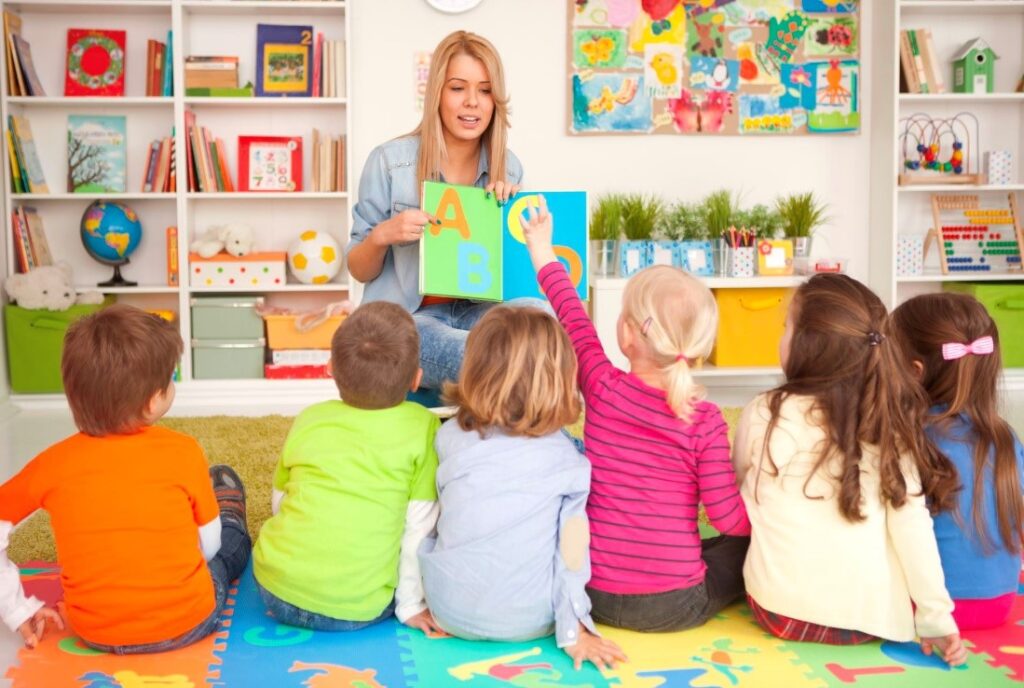Childcare checklist—how to choose the right centre

There’s a lot to consider when searching for a childcare centre for your child. Finding somewhere with the right mix of facilities, safety, development and experienced staff can be a stressful task. Thankfully, a childcare checklist makes it easier for you to get your thoughts down on paper and decide what’s right for your family.
Why using a childcare checklist is important
Childcare benefits children in many ways. They build on their developmental skills, from physical movement to communication, sharing and discovery. Childcare also gives children a safe environment to play, learn and experiment. They practise arts and crafts and learn processes like tidying up and making new friends. Childcare also has benefits for parents, allowing them to go back to work or spend a little time on themselves.
Some of the key benefits of childcare include developing
- Social and emotional skills
- Good habits
- Independence

Social and emotional skills
Social and emotional skills are two of the hardest things for parents to teach their children. With social skills, children learn quickest from their peers. While siblings and family members can speed up socialisation, spending time with similarly-aged children will help them with the important skills of making and building friendships. Emotional skills are similar. Children act differently when their parents are around, so learning how to act and behave when they’re not under your watchful eye takes a bit of practice.
Good habits
Children love to rebel against their parents, so if you struggle to get your children to help tidy up after meals, pack away their toys or wash their hands at appropriate times, you’re not alone. These sorts of habits are something that childcare can help with. Taking instructions from different adults and seeing other children displaying good habits can assist your child’s development. You may end up being pleasantly surprised by some of the traits they bring home.
Independence
One of the key goals of parenting is to raise children who will become independent and resilient. For young children, this can be a challenging journey to start if they’re constantly in the care of their parents. Many parents find the drop-off difficult at first. Toddlers don’t always understand what’s happening and don’t want to see their loved ones leaving, but over time, this gets easier. Your child will associate day care with good times, friendly teachers and new friends. And without a parent on hand to guide and help, your child will learn to make their own decisions and get better at solving problems.

Importance of choosing the right childcare
When you start searching for childcare services, you’ll soon see that there are lots available. This is where a childcare checklist can help simplify things.
So what’s the best childcare option? That depends on what you’re looking for. There are, however, some factors almost all families want from childcare:
- Safety and security
- Growth and development
- Preparation for school
Most childcare centres will focus on these areas (and more), but you may find that they will vary in what they prioritise for the children.
Safety and security
When you leave your child in someone else’s care, it’s only natural that you want them to be safe and secure. Every childcare operator must meet specific standards to be allowed to operate.
Growth and development
Being at day care is a valuable tool for the growth and development of your child. While there, they’ll be involved in many different activities to help them: from games that help build gross and fine motor skills to interesting activities that add in sneaky lessons, like counting or spotting letters of the alphabet—your child will learn a lot from day care.

Preparation for school
Many adults see day care centres as a stepping stone to primary school, but this is just one of the benefits. While children will be able to learn a lot of the necessary skills at home, being in a setting similar to school will help. They’ll understand the teacher-child relationship, get used to being around lots of children and be introduced to small formal teaching sessions.
Many skills your child will need—like basic writing, being confident with clothes and bags and going to the toilet independently—will be developed through going to day care.
Childcare checklist: essential considerations
When looking for the best childcare option for your family, it can be hard to know what to look for.
Some of the most critical items on your childcare checklist should be:
- Curriculum and program
- Meals and snacks
- Environment
- Experience of teachers
- Facilities and resources
- Convenience
- Flexibility
- Fees and payments
Once you evaluate these areas and weigh up which ones are most important for you, you’ll understand which centre is best for you.
Curriculum and program
As much of your child’s day will be spent at day care, it must be more than a play centre. While free play is vital for development and growth, paying for a service should give you more. Talk to the teachers about what they do to help your child learn and grow. Many centres will work with guardians to address specific areas of development.

Meals and snacks
Childcare centres have different policies on meals, drinks and snacks. Some provide all the food for your child during the day. This can be very beneficial for a parent as it takes a significant task off your hands, and it’s also an excellent way for your child to be introduced to new and different foods. This offer does, however, set a strict limit on what and when your child can eat. If your child has any food allergies, you should check to see how these will be catered to. And it’s also a good idea to see their nutrition policy to make sure it’s what you’re looking for.
Environment
When you leave your child somewhere, you want it to be perfect. The indoor sections should be well lit, and children should have lots of areas to relax and be comfortable. The atmosphere of the facility is also important. Do the children play and look like they’re happy and engaged? Are the staff enjoying their work, or are they stressed and frustrated?

Experience of teachers
While some care options for your child—like babysitters—don’t need to be highly qualified, there are places where you do need experience and qualifications. When you tour a childcare facility, ask about the experience of the teachers. Most should have or be studying towards a qualification. This will help give them better training and ideas to implement in their days. First aid training is also essential.
Facilities and resources
The facilities and resources of a childcare setting will have a significant influence on what your child gets out of their time there. There are different things to look out for. It is essential to have an outdoor area to play in, ideally with different ways to interact with nature and build gross motor skills. You also want to see they have access to lots of stimulating games, toys and books. As a general rule, the more your child can access at day care, the more they’ll learn and experiment with different things.
Convenience
Childcare exists to help parents, so it makes sense that it’s convenient. Major factors like location and opening hours will help you decide. Other minor factors, like having an onsite barista, may make your life a little bit easier too.
Flexibility
There may be times when you may need to change days—whether to pick up an extra spot if your work life changes or to drop some days during school holidays without having to pay for them. Having a bit of flexibility in how you use the centre is important for many families.
Fees and payments
There is, of course, the cost of childcare that must be taken into account. Before you start comparing the price and payments of different childcare choices, consider what you can afford to pay, which Government subsidies are available, the costs for transport to and from the centre, as well as for meals and snacks. This will make it easier to compare fees and pricing.
Use a childcare checklist to ensure the service you choose has a strong parent engagement app, like Home, which improves engagement with instant messaging and provides convenience with direct debit and other payments features.

